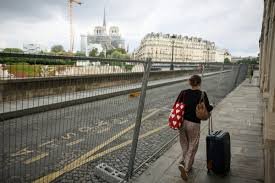As sports fans from across the globe get ready for the 2024 Paris Olympics, health officials and experts are urging vigilance while warning about potential disease risks for those attending the Summer Games in person.
The Olympics officially get under way on Friday, with more 10,000 athletes taking part and an estimated 15 million spectators expected to attend, including two million visitors.
The World Health Organization published new guidance last week for spectators travelling for the Olympic and Paralympic Games. The latter will start next month.
The guide, developed jointly by WHO Europe, the French Ministry of Health and Prevention, Santé Publique France and the European Centre for Disease Prevention and Control informs travellers about vaccinations, respiratory infections, heat risks and alcohol consumption, among other advice.“The thing about an Olympics or any kind of large event is you’ve got maximum population mixing,” said Colin Furness, associate professor at University of Toronto’s faculty of information.“You’ve got people coming from all over the globe and converging. That’s a lot more dangerous than a bunch of locals getting together at the local stadium where you all come from the same population,” he told Global News in an interview on Monday.
Furness said that the overriding risk to fans comes from crowds, especially indoors, and those can start as early as at the airport when lining up to check in, so wearing a face mask is highly recommended.
Given the rates of COVID-19 right now, he said “boarding a plane is actually particularly risky.”
The WHO guide said that before travelling to Paris, spectators should make sure they are up to date on their vaccinations, particularly for measles.“Cases of measles are on the rise worldwide, including in Europe and in France,” the joint guide said.“Anyone is at risk of measles if they have not been fully vaccinated or have not had measles in the past.”
Furness said that “it would be foolish” to get on an airplane and travel anywhere without being up to date with measles shots, which are “incredibly effective,” he said.
Before making the trip, other diseases to be vaccinated against may include whooping cough, tetanus, diphtheria, polio, and COVID-19, the WHO guide said.
Furness said masking on the plane and in big indoor crowds can keep Olympic attendees safe. He said the “more time you can spend outdoors, the better.”
To further protect yourself from respiratory infections while attending the summer Games, the WHO said to avoid close contact with sick people, wash or clean your hands frequently, and avoid touching your eyes, nose or mouth.“If you have symptoms, such as a cough, fever or sore throat, stay at home or in your hotel if possible and consider wearing a mask when you leave your hotel or home,” the joint guidance said.


